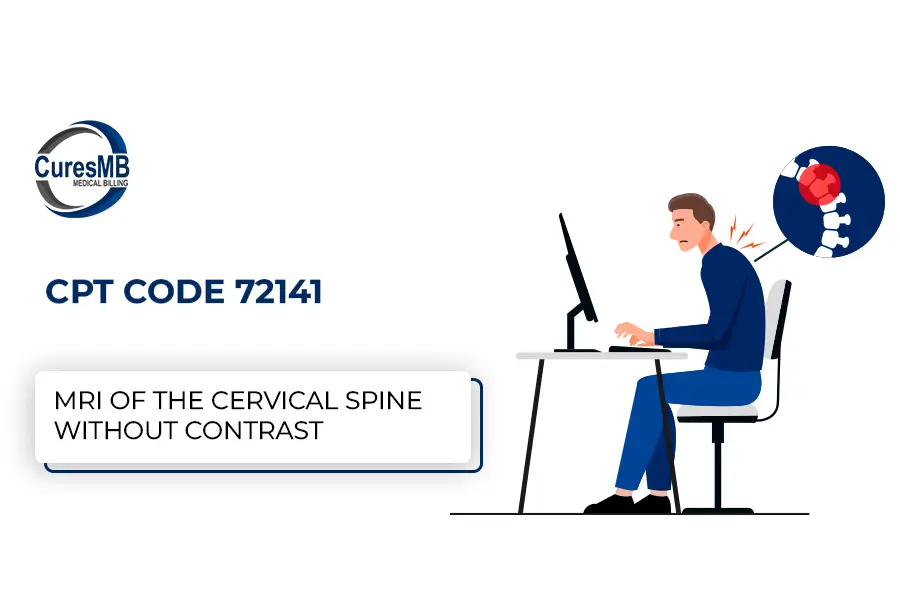
The ICD-10 designation M47.816 falls under other spondylosis without myelopathy, specifically affecting the lumbar area. This condition involves degenerative changes in the lower back vertebrae without evidence of spinal cord compression.
Clinically, it may present as chronic back pain, reduced mobility, and stiffness, often due to facet joint arthritis or disc degeneration.
In medical billing, selecting this code ensures that the diagnosis is linked to lumbar spine degeneration without neurological deficits, a key factor for payer compliance.
This diagnosis code can be used by:
Depending on the patient’s needs, medically necessary services may include:
When documenting and billing the M47.816 diagnosis code, commonly linked CPT codes include:
Fill out the form below and we’ll contact you shortly.
CPT Code | Procedure Description | ICD-10 Link (M47.816) | When to Use |
MRI, lumbar spine without contrast | M47.816 | For detailed imaging of degenerative changes without myelopathy. | |
72100 | X-ray, lumbar spine, minimum two views | M47.816 | When evaluating bony degeneration or spinal alignment. |
97110 | Therapeutic exercise | M47.816 | For strengthening and flexibility programs prescribed for lumbar degeneration. |
Physical therapy techniques | M47.816 | For mobilization or manipulation to relieve lumbar stiffness and pain. | |
20552 | Injection(s), single or multiple trigger points (1–2 muscles) | M47.816 | For pain management in lumbar paraspinal muscles linked to degeneration. |
99213 | Established patient office visit | M47.816 | For routine follow-up visits and management of lumbar spondylosis. |
99214 | Established patient, moderate complexity | M47.816 | For more complex cases requiring additional decision-making. |
62323 | Injection(s) of diagnostic or therapeutic substance, epidural or subarachnoid, lumbar | M47.816 | For pain control in cases where conservative care is insufficient. |
97530 | Activity-based therapy | M47.816 | Performance in patients with lumbar spine issues. |
Documentation Tip from CuresMB:
Always note “without myelopathy” in your clinical documentation. This ensures M47.816 is properly supported in audits and avoids unintentional upcoding.
Proper modifier use is essential to avoid claim rejections. Examples:
Payers require clear clinical documentation stating lumbar degeneration without myelopathy. Inadequate specificity can trigger claim denials or underpayments.
Ensure the M47.816 diagnosis code is tied to procedures that are clinically relevant to the patient’s condition, and verify compliance with the payer’s LCD/NCD requirements.
While related, these codes differ based on spinal region and whether myelopathy is present.
At CuresMB, we’ve seen providers lose thousands annually due to miscoding or incomplete documentation for lumbar spondylosis cases. Our revenue cycle experts ensure accurate coding, proper CPT pairing, and payer compliance, so you collect every dollar you’ve earned. Contact us today to schedule a billing audit and secure your reimbursements.
Using ICD-10 M47.816 correctly is essential for accurate documentation and billing of lumbar spondylosis cases where myelopathy is not present.
By pairing it with the correct CPT codes, avoiding common billing errors, and ensuring detailed documentation, healthcare providers can protect both compliance and revenue. CuresMB stands ready to help you maximize reimbursements and streamline coding accuracy.
It represents lumbar spondylosis without spinal cord involvement, covering degenerative changes in the lower spine that cause pain, stiffness, or limited mobility.
Lumbar facet syndrome refers specifically to facet joint pain, whereas M47.816 covers overall degenerative changes in the lumbar spine without neurological complications.
Healthcare providers, including physicians, chiropractors, and physical therapists, can document this code when treating patients with medically necessary lumbar spondylosis care.
Yes. Services like X-rays, MRI scans, or physical therapy sessions can be billed if linked to the documented diagnosis.
M47.16 is used when lumbar spondylosis involves myelopathy or spinal cord compression, whereas M47.816 is for non-myelopathy degenerative changes.
Proper documentation ensures correct coding, supports medical necessity, avoids claim denials, and optimizes reimbursement for treatments related to lumbar spondylosis.
Discover Cures Medical Billing Services Across Different States
FL
NY
ML
CO
NJ
AZ
TX
CA
WA
We are a team of national medical billing service experts based in Astoria, NY, committed to providing ongoing value to our customers. We leverage technology and implement best practices to provide high-quality and cost-efficient medical billing solutions from domestic locations, enabling customers to achieve their business goals. Cures Medical Billing is the best option for any medical billing needs.
Medical billing around Astoria, NY, and beyond is our core competency and our specialists will efficiently manage all your billing needs. Our medical billing specialists have over 12 Plus years of experience with all security technologies to ensure data integrity for our customers. Using our medical billing service, anyone can make their medical billing task less resource-consuming.
Efficiency & precision in healthcare financial management with Cures Medical Billing, your trusted partner for smarter, faster, and more accurate billing solutions.
This site uses cookies. Read our Privacy Policy